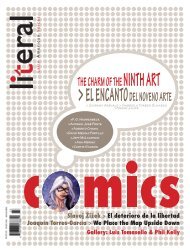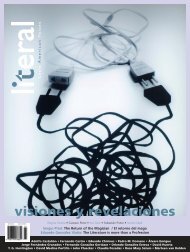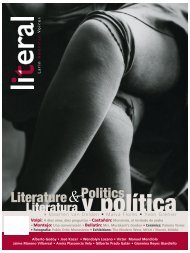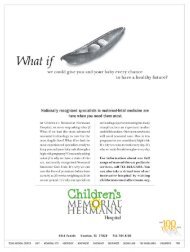Richard Serra - Literal
Richard Serra - Literal
Richard Serra - Literal
Create successful ePaper yourself
Turn your PDF publications into a flip-book with our unique Google optimized e-Paper software.
Una habitación desordenada / A Disorderly Room<br />
n Vivian Abenshushan<br />
Translated to English by Greg Dechant<br />
Sin desorden, cualquier habitación se convierte en un<br />
presidio. Es decir: en un lugar donde la vida ha sido expurgada.<br />
Sólo las casas convertidas en museos (generalmente<br />
por la celebridad de sus habitantes) guardan<br />
un orden inmutable. Están abandonadas, pero no acumulan<br />
polvo. Están a la vista de todos, pero ahí cada<br />
cosa permanece sometida a una vigilancia constante.<br />
Son casas de paso, de paseo, estancias evanescentes.<br />
Nos reciben con desconfi anza, como a unos desconocidos.<br />
Pocos tendrán tiempo para entrar en posesión<br />
de alguna de ellas, para registrar las señas de su deterioro.<br />
Muchos menos serán los que entiendan el origen<br />
lejano de una mancha en la alfombra. Y aunque estén<br />
pobladas de signos exteriores y ostentosos como en<br />
una galería, sin la vida doméstica que los animaba, es<br />
difícil ver en ellos los rasgos patentes de sus dueños. Es<br />
probable que el visitante erudito o apasionado descubra<br />
el trasfondo humano de un diván, la manía oculta<br />
en el desgaste de una silla. Pero, en general, no hay<br />
tarea más difícil y penosa que desvestir el luto que todo<br />
orden impone.<br />
Si un día nos ocurre visitar la casa-museo de un<br />
escritor al que admiramos, lo primero que buscamos<br />
en ella es el cuarto de trabajo, donde debió pasar la<br />
mayor parte de su tiempo. Ansiamos deslizarnos clandestinamente<br />
en esa escenografía que imaginamos laboriosa<br />
y descomunal: paredes atestadas de libreros,<br />
papeles desperdigados, tazas acumulándose sobre las<br />
sillas, libros entreabiertos unos encima de otros en<br />
procreación perpetua. Cierta superstición nos hace suponer<br />
que el escritor permanece agazapado en algún<br />
lado y, por eso, no queremos perdernos detalle. Sin<br />
embargo, al entrar en la habitación nos sorprende una<br />
lamentable distribución burocrática. Todo el mobiliario<br />
se encuentra en la forma y en el lugar debidos, sin esas<br />
bellas alteraciones que el desplazamiento cotidiano va<br />
organizando por aquí y por allá, prescindiendo de trámites<br />
y jerarquías. Así acomodadas, las cosas pierden<br />
su familiaridad, no se estorban ni avanzan unas contra<br />
otras, no se inmiscuyen ni murmuran; languidecen de<br />
hastío. Nos estremecemos ante el hallazgo de una pluma<br />
cerca del tintero, pero, por más signifi caciones que<br />
queramos endilgarle, si está fuera de uso, la pluma de<br />
Goethe queda reducida a la conformidad de un objeto<br />
Without disorder, a room becomes a prison. That is: a<br />
place from which life has been expurgated. Only houses<br />
converted into museums (owing in general to the<br />
fame of their inhabitants) maintain an immutable order.<br />
They are abandoned, but they do not gather dust.<br />
They are in view of all, but every object in them remains<br />
subject to constant supervision. They are house<br />
to pass through, houses to visit, evanescent sojourns.<br />
They receive us with mistrust, as strangers. Few will<br />
have time to take possession of any one of them, to<br />
record the signs of its decay. And fewer still will come<br />
to understand the remote origin of a stain on the carpet.<br />
However full they may be of ostentatious exterior<br />
signs, as in a gallery, without the domestic life that<br />
animated them, it is diffi cult to see in them the clear<br />
traces of their owners. It may be that the erudite or<br />
enthusiastic visitor will penetrate the human depths of<br />
a divan, the mania hidden in the worn upholstery of a<br />
chair. But in general there is no task so diffi cult and so<br />
laborious as divesting a thing of the mourning imposed<br />
on it by order.<br />
If it should occur to us one day to visit the museumhouse<br />
of a writer whom we admire, the fi rst thing we<br />
would look for in it is the workroom, where he must<br />
have spent most of his time. We are anxious to slip<br />
surreptitiously into this setting which we imagine to be<br />
industrious and extraordinary: walls lined with books,<br />
papers scattered about, coffee cups piling up on the<br />
chairs, books lying open one atop another in perpetual<br />
procreation. A certain superstition leads us to suppose<br />
that the writer remains crouched down somewhere,<br />
so we do not want to miss a single detail. On entering<br />
the room, however, we are surprised by a lamentably<br />
bureaucratic organization. All of the furniture is in its<br />
place, without those charming alterations that day-today<br />
readjustments tend to establish, free of rank and<br />
procedure. Arranged thus, things lose their familiarity,<br />
they neither get in the way of, nor gain ground on, one<br />
another, they neither mingle nor murmur: they languish<br />
in boredom. We may quiver with emotion at the sight<br />
of a quill next to its inkwell, but whatever signifi cance<br />
we wish to foist on the discovery, even Goethe’s pen,<br />
if it is not in use, is reduced to conformity with any<br />
other object, and loses its meaning. We were looking<br />
OTOÑO, 2007 • LITERAL. VOCES LATINOAMERICANAS 3 25






